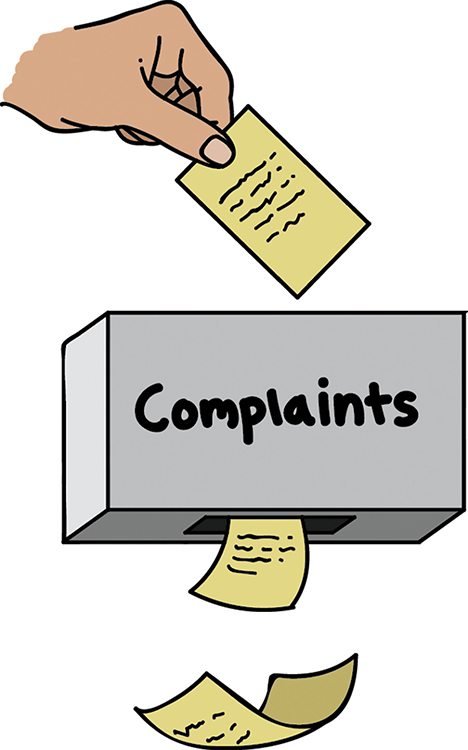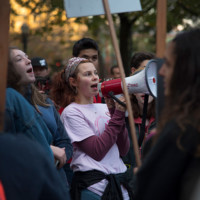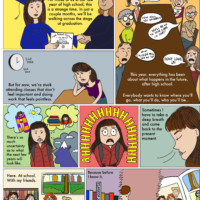 On February 27, senior Bex Goshorn opened the door to the gender-neutral bathroom in the basement of Grant High School. As they stepped into the stall, they saw it.
On February 27, senior Bex Goshorn opened the door to the gender-neutral bathroom in the basement of Grant High School. As they stepped into the stall, they saw it.
Scrawled onto the wall in black marker, the graffiti read: “The fag(g)ots who use this restroom are going to burn in hell” and “your gay ass is gonna get shot.”
Goshorn, who is gender non-binary and uses they/them pronouns says, “Whoever wrote that hate took away my freedom and forced me into an uncomfortable situation.”
Goshorn took a picture of the graffiti and rushed to a nearby art teacher’s classroom to tell them about it. By the end of the day, the writing had been painted over and reported to the administration.
An entire week later, there was no public response from the administration about the graffiti. But talk of the incident was gaining traction on social media. Students posted concerned messages on Facebook, some angered that one of their classmates could write such a thing, others fearful for their well being.
The lack of response from the administration around this incident and other recent events raises serious concerns surrounding communication and decision-making at Grant High School.
When local news stations published stories about the graffiti incident on March 7, students at Grant were shocked that they hadn’t heard anything from the administration.
“We didn’t purposefully not say anything to try to hide it or to push it under the rug,” says Principal Carol Campbell on the graffiti incident. She claims they were waiting for “an opportune time to address the community,” and “wanted to complete a little bit of an investigation.”
But the wait was not received well by students. “The amount of time that the administration was silent kind of sent out a dangerous message for me,” says senior Lior Gevurtz, who identifies as gender-fluid and uses they/them pronouns, adding that the administration’s silence “expressed the message that they don’t care. That it’s not a big enough deal.”
Senior Bobbie McMahon, who identifies as gender-fluid and uses they/them pronouns, agrees. “We didn’t hear it from the school … and I feel like hearing through the grapevine was worse,” says McMahon. “I’d rather have the facts, even if they are bad, than pretending that they don’t exist.”
Other recent incidents have left students at Grant feeling like the administration isn’t thinking about how their decisions affect students.
On March 8, the “Culture of Consent” posters put up around the school to raise awareness around sexual assault were removed from the walls with little explanation.
The same day students were told they could not put up signs to promote “Period Week,” a movement to destigmatize menstruation and offer free menstrual hygiene products to students.
The reasoning behind both decisions was to prevent potential vandalism and from the issue becoming trivialized. They instead wanted to encourage students to try a more informative approach. But what message does this send to students about how much the school values consent or the menstruation movement?
Junior Zoe Estep-Shaw, who was involved with the Culture of Consent and Period Week campaigns and identifies as female and uses she/her pronouns, thinks these actions show that the administration focuses too much on sheltering students rather than sparking discussions on the issues. “It frankly makes me feel disappointed that they don’t trust us enough or think we have the capability to deal with it,” she says, adding that she wished there had been more communication throughout the whole process.
This isn’t the only time the administration has lacked thorough communication. On March 9, Grant went into lockdown procedure. An email from PPS Communications to all parents following the lockdown said: “This morning at 10:32 a.m. Grant High School administrators issued a Lockdown Team Response due to a suspicious bag left by an unknown subject. Police were called immediately to inspect the situation.”
However, no announcements were made and no email was sent to students, leaving most to guess what had occurred that day. Some students even thought the lockdown may have been related to the violent threats left in the gender inclusive restroom, which caused many to panic.
Had the administration given more information to students, the rumors would not have spread and students would not have been left in fear.
Many students at Grant are understandably upset. They feel left out of the conversation. They feel like their identities and the issues they care about are not being valued, pushing some to even respond with more graffiti, like on March 13 when “DESTROY THE GENDER BINARY” and “RADICAL ANGRY QUEERS” were spray-painted onto the Grant tomb in the front of the school.
But the school has an opportunity now to show that it puts students first.
Students would like more communication on the events – good and bad – that are happening here. They would like more transparency around why the administration makes the decisions they do. And although they may be young, they would like to confront issues head-on and commit to conversations about gender and sexuality, consent and menstruation, rather than be sheltered from possible responses.
For Grant High School to succeed moving forward, there needs to be more collaboration and input from all functioning bodies of the community. While administrators may think they are making the right decisions for students, they need to be willing to listen and reflect when they are not doing it effectively. ◆




